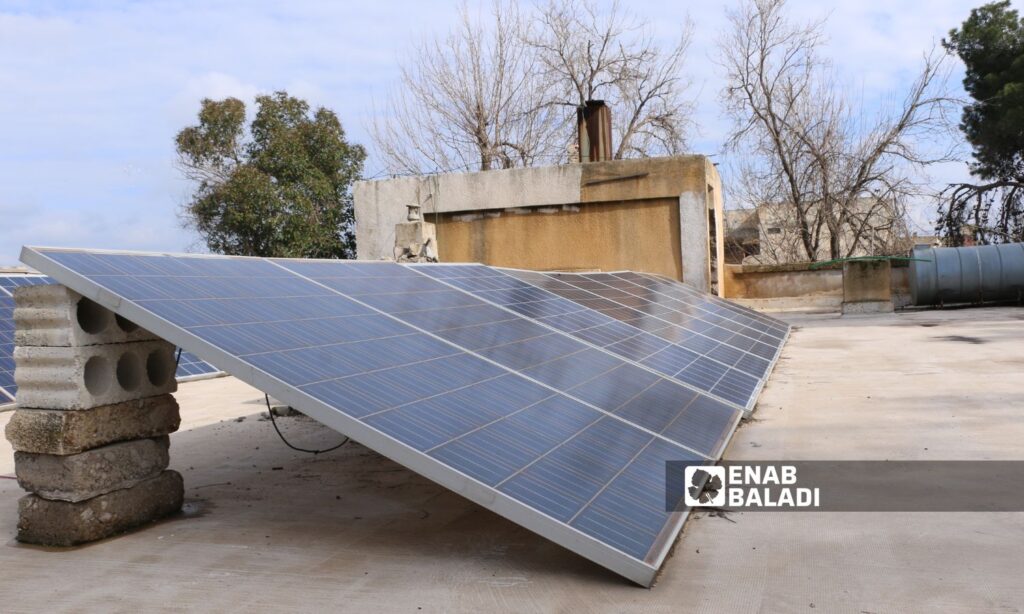The efficiency of solar panels declines during winter because of cloudy weather and shorter daylight hours, causing seasonal suffering for the residents of Ras al-Ain, west of al-Hasakah, who rely on solar energy to generate electricity. This leads to weak charging of the batteries by the panels, meaning less electricity.
Since 2019, the inhabitants of the countryside of Ras al-Ain have turned to solar energy systems as a main source of electricity, due to the battles between the Syrian Democratic Forces (SDF) and the Turkey-backed Syrian National Army (SNA), which caused a complete blackout in the countryside.
Yasser al-Soufi from the village of Hameed told Enab Baladi that he has been suffering from daily power outages since the beginning of winter due to the cloudy weather, stating that the installed solar power systems at his home do not suffice to operate basic appliances like the refrigerator and water pump. He also mentioned that he only operates his electricity generator when absolutely necessary due to the high fuel prices.
From his side, Faisal al-Rustom, a resident of al-Manajir village, said he was optimistic when he installed a complete solar power system last summer for $1,250 USD.
Al-Rustom explained to Enab Baladi that the system was highly effective in summer, operating all household appliances, such as the refrigerator, water pump, and air conditioner. However, since the beginning of autumn, the batteries have lost their ability to hold charge, causing the solar panels to cease functioning completely since the beginning of December 2023, due to the dense clouds and rain.
Currently, the man relies on continuously charging the batteries using his car to provide lighting for the house, while the other appliances are not in operation due to the weak battery charge.
Solar panels on the roof of Umm al-Kheir municipality in the countryside of Ras al-Ain, northwest of al-Hasakah – February 16, 2024 (Enab Baladi)
Impact on market activity
The inefficacy of solar energy in winter has extended beyond individual family use to impact small economic projects, causing losses for their owners and affecting the continuity and financial stability of their businesses, increasing their suffering amidst current economic challenges.
Abdul Aziz Sarya, owner of a frozen meat shop in Abu al-Soon village, pointed out that sales dropped significantly due to the inability of freezers to provide necessary cooling or to maintain the quality of frozen meats, risking spoilage.
Sarya told Enab Baladi that he was forced to temporarily close his shop until the end of winter, as alternatives for energy provision are exorbitantly expensive. This was also explained by Hamid al-Salman, owner of a shop selling solar panels in Ras al-Ain, stating that the situation requires increasing battery capacity or installing hybrid (photovoltaic) energy systems.
In Sarya’s opinion, the locals need more effective solar energy systems, which is unfeasible due to high costs and limited financial capabilities, calling for government support in this area.
The price of a hybrid (photovoltaic) panel exceeds 150 USD, compared to a regular panel that does not exceed 40 USD, according to a shop owner selling solar panels.
A solar power system in one of the houses in the countryside of Ras al-Ain has seen its charging rate drop to only 20%, due to winter weather conditions – February 16, 2024 (Enab Baladi)
Victims of conflicts and neglect
The inhabitants of the countryside of Ras al-Ain have been suffering from power outages for more than four years, and the area is under the control of the Turkey-backed Syrian Interim Government (SIG).
Ak Energy company manages the electricity sector in the region, but electricity has been completely absent from the countryside since 2019, with near-daily outages in the city that last between 8 and 9 consecutive hours, extending overnight into the morning.
A responsible source within the AK Energy electricity company in Ras al-Ain previously told Enab Baladi that the main reason for the absence of Turkish electricity in the western and eastern countryside is the substantial amount of theft in the city.
The source (who requested anonymity as he is not authorized to speak) clarified that the company is incurring severe losses, which has led to postponing the countryside project until the excesses on the electrical network are managed and corrected before fully delivering electricity to the countryside.

